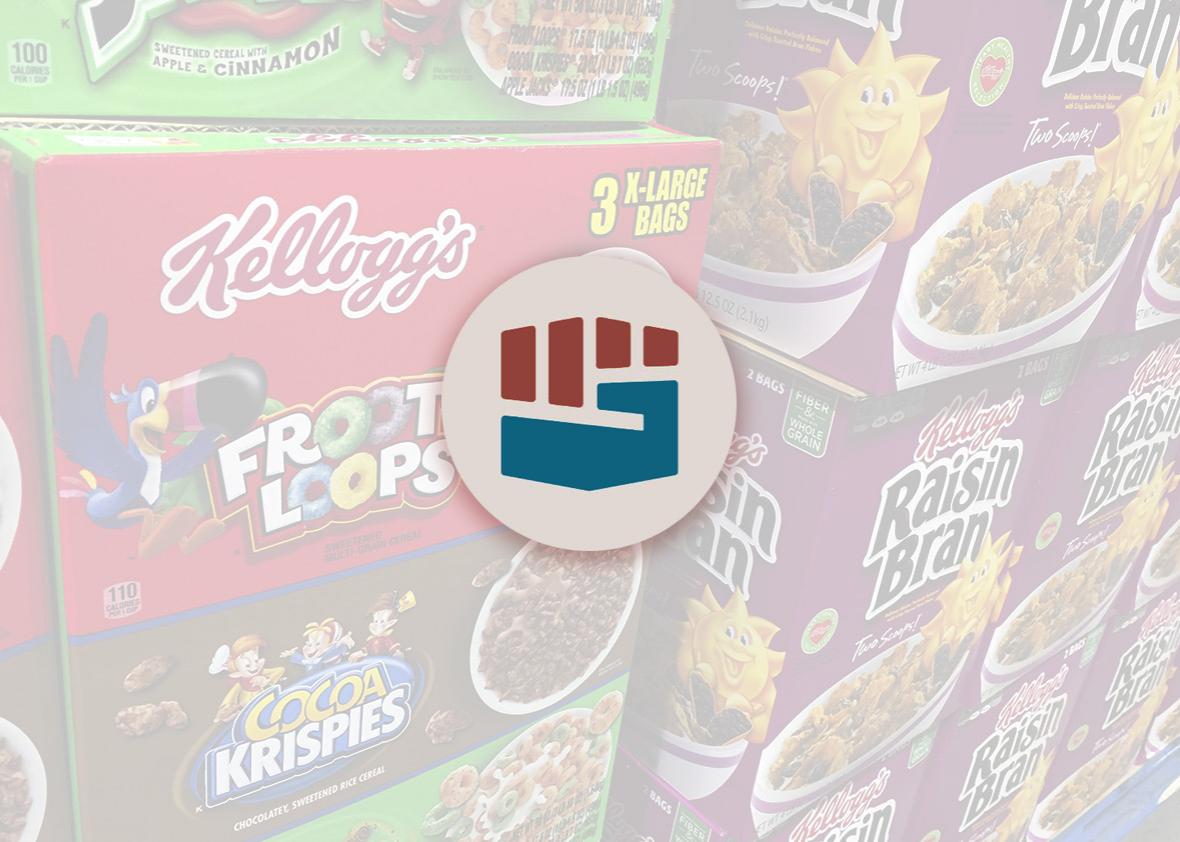Want to take a stand against Breitbart, the site formerly headed by Trump adviser Steve Bannon that Bannon once called “the platform for the alt-right”? A Twitter account called Sleeping Giants offers one idea: Go after the site’s advertisers.
The Sleeping Giants account says 255 companies have pulled ads from Breitbart as of Thursday. Of them, Kellogg’s, the company behind a dizzying array of breakfast and other foods, has gotten the most attention. After the company removed its advertising from Breitbart on Tuesday, the site responded with a #DumpKelloggs countercampaign. “Boycotting Breitbart News for presenting mainstream American ideas is an act of discrimination and intense prejudice,” Breitbart editor-in-chief Alexander Marlow wrote on Nov. 30. “If you serve Kellogg’s products to your family, you are serving up bigotry at your breakfast table.” Naturally, this inspired a liberal counter-countercampaign to buy up Kellogg’s products:
Sleeping Giants’ approach here isn’t new, of course. Pressuring advertisers to drop support for broadcasters or publishers is a time-honored political strategy, one notably embraced in the past by conservative groups like Christian Leaders for Responsible Television and the American Family Association and coordinated by phone or mail. But in coordinating online to attack digital advertising, Sleeping Giants is taking a page from a group that recently showed how easily a dedicated group can kneecap a website’s support.
In 2014, angry members of the Gamergate movement went after Gawker Media, including flagship site Gawker, costing the company a reported “seven figures” in ad revenue. Gamergate was spawned out of a controversy over inaccurate claims that a writer at the Gawker Media site Kotaku had positively reviewed an indie game by a developer he was dating. Incensed, Gamergate trolls launched a vicious campaign against the developer and other women that included violent threats and the leaking of personal information.
After Gawker writer Sam Biddle joked about the need to bully Gamergate’s “nerds,” the movement’s troll army built a letter-writing effort around Gawker’s supposed endorsement of bullying. “Your company is listed as an advertising affiliate with Gawker,” one suggested sample email read. “In light of Mr. Biddle’s comments, and [Gawker editor Max Read’s] support of said comments, I urge you to withdraw said advertising support from Gawker and all its affiliates. This is National Bullying Awareness Month, and these comments are unacceptable in a society where several thousand people commit suicide each year due to bullying.”
Adobe and BMW were reportedly among the companies that pulled their campaigns from Gawker Media. So damaging was the flight of advertisers that Read would later list Gamergate as one potential culprit in the site’s demise.
The Gamergate campaign was at once more vitriolic and more sophisticated than the Sleeping Giants effort seems to be. On Reddit and elsewhere, Gamergaters hyperventilated over the alleged malice of individual writers and compiled lists of PR and marketing executives to contact. One Reddit user posted that he’d spent more than two hours constantly refreshing Gawker pages to put together a more complete list of the site’s advertisers and had even gone as far as using virtual private networks to simulate visits from Romania so he could document foreign ads:
Article on NBC Cameraman surviving ebola shows a couple ads in languages I can’t read. Monoqi and ClinLife … seems to be a renal cell thing? I don’t know what that means. IDK if these are actual companies or what, I can’t research it. I should have gotten a screen cap but wasn’t thinking. Won’t make that mistake again.
“What I’d missed about Gamergate,” Read later wrote, “was that they were gamers—they had spent years developing a tolerance for highly repetitive tasks.”
Sleeping Giants, by contrast, is more dependent on casual participation. There’s no doggedly determined group time-stamping every appearance of a new ad on Breitbart. Nor are Sleeping Giants’ protesters acting out a personal vendetta; they’re driven by concern about the racism, misogyny, and xenophobia on display at Breitbart, a site with, for example, a “black crime” vertical that once called Muslims in the West a “ticking time bomb.”
Yet the two campaigns share a basic core strategy. Targeting advertisers—the only major source of revenue available to most online media—is the surest way to bring a site to its knees. Ad representatives, not terribly worried about the value of ads at niche sites like Breitbart and Gawker in a world with millions of others to choose from, may well cave to avoid the PR fallout of a viral effort. The losses incurred by Gawker demonstrated that these kinds of attacks can inflict real damage, even if they don’t ultimately bring sites down. Breitbart’s own Allum Bokhari wrote as much in the wake of the anti-Gawker campaign, in a rhapsodic piece praising Gamergate for taking advantage of the influential site’s inherent vulnerability:
Throughout history, great empires, states, political movements and institutions have all fallen victim to the myth of invincibility. From the Romans at the Battle of Teutoburg to the British Empire in the Boer war, the destruction of these myths is all the more painful due to the triumphs that preceded them. Few would call Gawker invincible today.
Gawker vs. Gamergate had all the features of a historic humiliation. On the one hand, there was Gawker, one of the web’s Great Powers. A well-resourced, New York-based “internet bully” with a reputation for destroying people. On the other hand, there were gamers—disorganised amateurs. It’s hard to find a better underdog story.
Thanks to Sleeping Giants, perhaps a better underdog story has arrived. But for better and worse, online activists have shown just how easily the digital economy allows agitators to make web publishers feel their pain.
